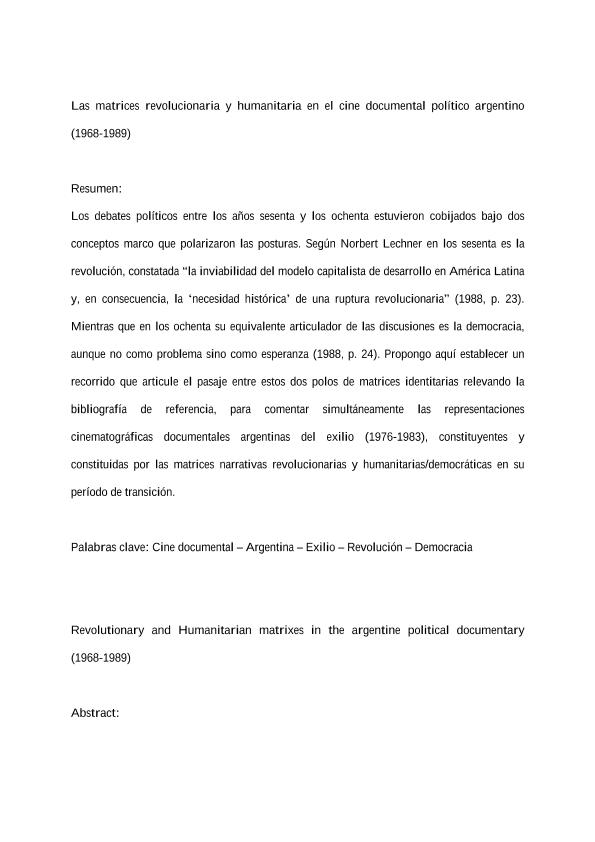Artículo
Los debates políticos entre los años sesenta y los ochenta estuvieron cobijados bajo dos conceptos marco que polarizaron las posturas. Según Norbert Lechner en los sesenta es la revolución, constatada "la inviabilidad del modelo capitalista de desarrollo en América Latina y, en consecuencia, la 'necesidad histórica' de una ruptura revolucionaria" (1988, p. 23). Mientras que en los ochenta su equivalente articulador de las discusiones es la democracia, aunque no como problema sino como esperanza (1988, p. 24). Propongo aquí establecer un recorrido que articule el pasaje entre estos dos polos de matrices identitarias relevando la bibliografía de referencia, para comentar simultáneamente las representaciones cinematográficas documentales argentinas del exilio (1976-1983), constituyentes y constituidas por las matrices narrativas revolucionarias y humanitarias/democráticas en su período de transición. Political debates between the sixties and the eighties were sheltered under two headings which polarized positions. For Norbert Lechner in the sixties is the revolution, observed "the infeasibility of the capitalist model of development in Latin America and, consequently, the 'historical necessity' of a revolutionary rupture" (1988: 23). While in the eighties equivalent articulator of the discussions is democracy, but not as a problem but as hope (1988: 24). I propose here to establish a route that links the passage between these two poles of identity matrices relieving the literature reference, to comment simultaneously Argentine documentary film representations of exile (1976-1983), and constituent revolutionary and humanitarian / democratic narratives in its transition period.
Las matrices revolucionaria y humanitaria en el cine documental político argentino (1968-1989)
Fecha de publicación:
01/2014
Editorial:
Universidad de Guadalajara. Departamento de Historia
Revista:
El ojo que piensa
ISSN:
2007-4999
e-ISSN:
1665-7047
Idioma:
Español
Tipo de recurso:
Artículo publicado
Clasificación temática:
Resumen
Palabras clave:
Argentina
,
Documental
,
Exilio
,
Democracia
Archivos asociados
Licencia
Identificadores
Colecciones
Articulos(SEDE CENTRAL)
Articulos de SEDE CENTRAL
Articulos de SEDE CENTRAL
Citación
Campo, Javier Alberto; Las matrices revolucionaria y humanitaria en el cine documental político argentino (1968-1989); Universidad de Guadalajara. Departamento de Historia; El ojo que piensa; 5; 9; 1-2014; 1-20
Compartir




